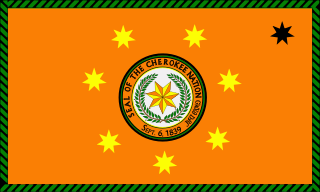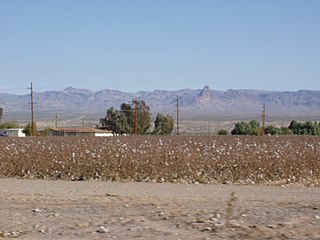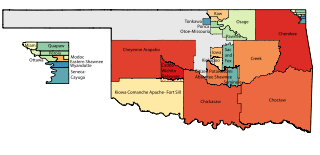
Native American gaming comprises casinos, bingo halls, slots halls and other gambling operations on Indian reservations or other tribal lands in the United States. Because these areas have tribal sovereignty, states have limited ability to forbid gambling there, as codified by the Indian Gaming Regulatory Act of 1988. As of 2011, there were 460 gambling operations run by 240 tribes, with a total annual revenue of $27 billion.

Tribal sovereignty in the United States is the concept of the inherent authority of Indigenous tribes to govern themselves within the borders of the United States.

Indian country is any of the many self-governing Native American/American Indian communities throughout the United States. As a legal category, it includes "all land within the limits of any Indian reservation", "all dependent Indian communities within the borders of the United States", and "all Indian allotments, the Indian titles to which have not been extinguished."

The Indian Gaming Regulatory Act is a 1988 United States federal law that establishes the jurisdictional framework that governs Indian gaming. There was no federal gaming structure before this act. The stated purposes of the act include providing a legislative basis for the operation/regulation of Indian gaming, protecting gaming as a means of generating revenue for the tribes, encouraging economic development of these tribes, and protecting the enterprises from negative influences. The law established the National Indian Gaming Commission and gave it a regulatory mandate. The law also delegated new authority to the U.S. Department of the Interior and created new federal offenses, giving the U.S. Department of Justice authority to prosecute them.

The Cherokee Nation, also known as the Cherokee Nation of Oklahoma, is the largest of three Cherokee federally recognized tribes in the United States. It includes people descended from members of the Old Cherokee Nation who relocated, due to increasing pressure, from the Southeast to Indian Territory and Cherokee who were forced to relocate on the Trail of Tears. The tribe also includes descendants of Cherokee Freedmen, Absentee Shawnee, and Natchez Nation. As of 2023, over 450,000 people were enrolled in the Cherokee Nation.

Neil McGill Gorsuch is an American jurist who serves as an associate justice of the Supreme Court of the United States. He was nominated by President Donald Trump on January 31, 2017, and has served since April 10, 2017.

The Major Crimes Act is a law passed by the United States Congress in 1885 as the final section of the Indian Appropriations Act of that year. The law places certain crimes under federal jurisdiction if they are committed by a Native American in Native territory. The law follows the 1817 General Crimes Act, which extended federal jurisdiction to crimes committed in Native territory but did not cover crimes committed by Native Americans against Native Americans. The Major Crimes Act therefore broadened federal jurisdiction in Native territory by extending it to some crimes committed by Native Americans against Native Americans. The Major Crimes Act was passed by Congress in response to the Supreme Court of the United States's ruling in Ex parte Crow Dog that overturned the federal court conviction of Brule Lakota sub-chief Crow Dog for the murder of principal chief Spotted Tail on the Rosebud Indian Reservation.

The Muscogee Nation, or Muscogee (Creek) Nation, is a federally recognized Native American tribe based in the U.S. state of Oklahoma. The nation descends from the historic Muscogee Confederacy, a large group of indigenous peoples of the Southeastern Woodlands. Official languages include Muscogee, Yuchi, Natchez, Alabama, and Koasati, with Muscogee retaining the largest number of speakers. They commonly refer to themselves as Este Mvskokvlke. Historically, they were often referred to by European Americans as one of the Five Civilized Tribes of the American Southeast.
The Alabama–Quassarte Tribal Town is both a federally recognized Native American tribe and a traditional township of Muskogean-speaking Alabama and Coushatta peoples. Their traditional languages include Alabama, Koasati, and Mvskoke. As of 2014, the tribe includes 369 enrolled members, who live within the state of Oklahoma as well as Texas, Louisiana, and Arizona.

Indian country jurisdiction, or the extent which tribal powers apply to legal situations in the United States, has undergone many drastic shifts since the beginning of European settlement in America. Over time, federal statutes and Supreme Court rulings have designated more or less power to tribal governments, depending on federal policy toward Indians. Numerous Supreme Court decisions have created important precedents in Indian country jurisdiction, such as Worcester v. Georgia, Oliphant v. Suquamish Tribe, Montana v. United States, and McGirt v. Oklahoma.
United States v. Lara, 541 U.S. 193 (2004), was a United States Supreme Court landmark case which held that both the United States and a Native American (Indian) tribe could prosecute an Indian for the same acts that constituted crimes in both jurisdictions. The Court held that the United States and the tribe were separate sovereigns; therefore, separate tribal and federal prosecutions did not violate the Double Jeopardy Clause.
Solem v. Bartlett, 465 U.S. 463 (1984), was a United States Supreme Court case involving Indian country jurisdiction in the United States that decided that opening up reservation lands for settlement by non-Indians does not constitute the intent to diminish reservation boundaries. Therefore, reservation boundaries would not be diminished unless specifically determined through acts of Congress.

Oklahoma Tribal Statistical Area is a statistical entity identified and delineated by federally recognized American Indian tribes in Oklahoma as part of the U.S. Census Bureau's 2010 Census and ongoing American Community Survey. Many of these areas are also designated Tribal Jurisdictional Areas, areas within which tribes will provide government services and assert other forms of government authority. They differ from standard reservations, such as the Osage Nation of Oklahoma, in that allotment was broken up and as a consequence their residents are a mix of native and non-native people, with only tribal members subject to the tribal government. At least five of these areas, those of the so-called five civilized tribes of Cherokee, Choctaw, Chickasaw, Creek and Seminole, which cover 43% of the area of the state, are recognized as reservations by federal treaty, and thus not subject to state law or jurisdiction for tribal members.
United States v. John, 437 U.S. 634 (1978), was a case in which the Supreme Court of the United States held that lands designated as a reservation in Mississippi are "Indian country" as defined by statute, although the reservation was established nearly a century after Indian removal and related treaties. The court ruled that, under the Major Crimes Act, the State has no jurisdiction to try a Native American for crimes covered by that act that occurred on reservation land.

Both the Oklahoma and Indian Territories contained suzerain Indian nations that had legally established boundaries. The US federal government allotted collective tribal landholdings through the allotment process before the establishment of Oklahoma as a state in 1907. Tribal jurisdictional areas replaced the tribal governments, with the exception of the Osage Nation. As confirmed by the Osage Nation Reaffirmation Act of 2004, the Osage Nation retains mineral rights to their reservation, the so-called "Underground Reservation".
Same-sex marriage has been legal in Oklahoma since October 6, 2014, following the resolution of a lawsuit challenging the state's ban on same-sex marriage. On that day, following the U.S. Supreme Court's refusal to review Bishop v. Smith, a case that had found the ban unconstitutional, the Tenth Circuit Court of Appeals ordered Oklahoma to recognize same-sex marriages. On January 14, 2014, Judge Terence C. Kern of the U.S. District Court for the Northern District of Oklahoma declared the state's statutory and constitutional same-sex marriage bans unconstitutional. The case, Bishop v. Smith, was stayed pending appeal. On July 18, 2014, a panel of the Tenth Circuit upheld Kern's ruling overturning Oklahoma's same-sex marriage ban. However, the panel put its ruling on hold pending disposition of a petition for certiorari by the U.S. Supreme Court. On October 6, 2014, the U.S. Supreme Court rejected the request for review, leaving the Tenth Circuit Court's ruling in place. State officials responded by implementing the Tenth Circuit's ruling, recognizing same-sex marriage in the state.
Sharp v. Murphy, 591 U.S. ___ (2020), was a Supreme Court of the United States case of whether Congress disestablished the Muscogee (Creek) Nation reservation. After holding the case from the 2018 term, the case was decided on July 9, 2020, in a per curiam decision following McGirt v. Oklahoma that, for the purposes of the Major Crimes Act, the reservations were never disestablished and remain Native American country.

This Land is an American political podcast produced and distributed by Crooked Media and Cadence13, and hosted by Rebecca Nagle. The podcast debuted on June 3, 2019 and follows the United States Supreme Court case Sharp v. Murphy. In addition, the podcast discusses various Native issues such as land rights, sovereignty issues, and the Indian Child Welfare Act.
Oklahoma v. Castro-Huerta, 597 U.S. ___ (2022), was a United States Supreme Court case related to McGirt v. Oklahoma, decided in 2020. In McGirt, the Supreme Court ruled that the U.S. Congress never properly disestablished the Indian reservations of the Five Civilized Tribes in Oklahoma when granting its statehood, and thus almost half the state was still considered to be Native American land. As a result of McGirt, crimes under the Major Crimes Act by Native Americans in the reservations are treated as federal crimes rather than state crimes.

Sara Elizabeth Hill is a Cherokee and American attorney who has served as a United States district judge of the United States District Court for the Northern District of Oklahoma since 2024. She previously served as the attorney general of the Cherokee Nation from August 2019 to August 2023 and as the tribe's secretary of natural resources between October 2015 and August 2019.












